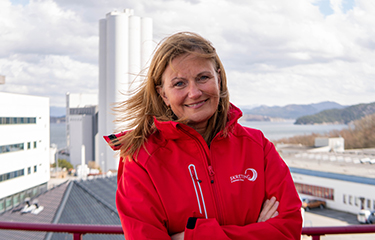Skretting highlights transparency in latest sustainability report

Nutreco’s aquafeed subsidiary, Skretting, released what it is calling its most-transparent sustainability report yet.
The report, released on Skretting’s website, carries a review of the company’s environmental impact – including revealing the company’s scope 1, 2, and 3 absolute carbon footprint. Skretting said the report carries an “unparalleled” level of transparency compared to previous years.
"We are thrilled to unveil our most transparent sustainability report to date," Skretting CEO Therese Log Bergjord said in a release. "We recognize the urgent need for accountability and action and this report showcases our steadfast commitment to transparency. It outlines the progress we have made in achieving our ambitious sustainability goals, while also issuing calls to action to ourselves, our suppliers, our customers, and our peers."
In a forward for the report, Bergjord called 2022 a “year of action” for Skretting.
“Over the past few years, I’ve talked a lot about how we are not doing enough, and we need to do better. While it may take some time for me to stop saying that, I’m happy to report that although we are still finding ways to meet our ambitious objectives, we have made significant progress in 2022,” she said.
Skretting highlighted a 46 percent reduction in emissions by its Norwegian division, an increased level of disclosure of its aquafeed ingredients and its use of antibiotics. Skretting reported achieving a 5 percent reduction in its global carbon footprint, and said 54.7 percent of the electricity it used came from renewable sources.
Skretting Sustainability Manager Jorge Diaz said in the report that the carbon footprint of its aquafeed is an important aspect of the company's decision whether to use it, but it isn't the exclusive reason.
“For example, what happens if an ingredient comes with a higher footprint (because it hasn’t scaled up yet), but helps us to find solutions to other impacts that are not measured by the carbon footprint, such as biodiversity loss?” he said. “We need to look at the different trade-offs and take decisions based on a multi-impact approach rather than only a footprint number.”
Diaz said Skretting's effort to reduce the use of antibiotics must improve. He said Skretting used less than 2,000 kilograms of critically important antibiotics (CIA) in 2022, on a subscription basis only.
“In some cases, a CIA is the only antibiotic that works and/or is available to treat specific diseases,” the company’s report states. “This poses a further dilemma – we could stop producing feed containing antibiotics, but by doing so, we risk pushing antibiotic application further down the production chain, for example, farmers applying medication to the feed on-farm.”
Diaz the sustainability report was an iterative learning process for his company.
“This report is our most transparent yet," Diaz said "There are a number of parameters that we are reporting for the first time ever, either because we now have the ability to report on those numbers, or because we simply believe that it is the right thing to do to share our journey – even the markers that we are not so proud of."
Bergjord she was satisifed the company was making progress on issues necessary to achieving its goals.
“Sustainability is not something that I believe we should compete on in our industry. It should not be a competition for who has more or better targets, or who has a lower or higher carbon footprint,” she said. “Instead, this should be a collaboration to accelerate the progress that we all need to ensure that we can contribute with healthy, safe, and accessible seafood for the people of the world.”
Photo courtesy of Skretting






Share